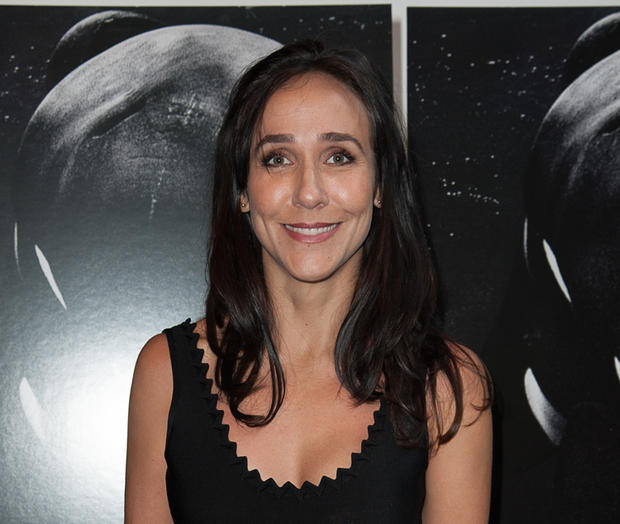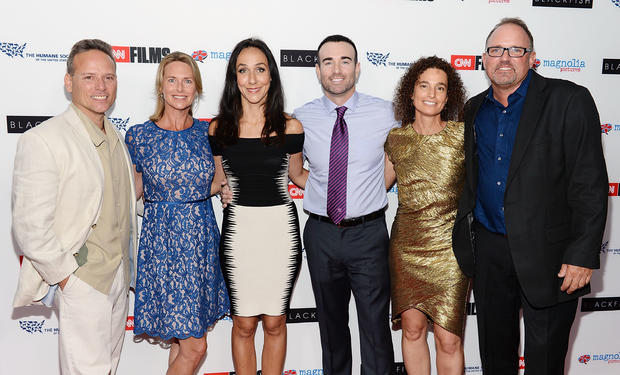Movie Blog: Q & A With 'Blackfish' Director Gabriela Cowperthwaite
SeaWorld is not happy with Gabriela Cowperthwaite.
She made Blackfish, a documentary about killer whales and the consequences -- in some cases deadly -- of keeping them in captivity. And let's just say SeaWorld doesn't end up looking too pretty.
To be fair, no representatives from SeaWorld appear in the film. Cowperthwaite told me they declined to comment, even though she went to great lengths to reach out to them. I found this hurt the journalistic side of the film (to say it's one-sided would be an understatement), but the argument made in Blackfish still stands, buttressed by ex-trainer testimony and words from killer whale experts.
Captivity, so it goes, isn't what's best for these massive, emotional apex predators. They're too smart, too social and too big to be cooped up in glorified swimming pools. And sometimes the conditions of captivity play a factor in tragedy, like the deaths of killer whale trainers.
I spoke with Cowperthwaite last week, and she said SeaWorld recently sent a letter to a bunch of film critics, discrediting her film as dishonest. In response to the PR damage control, Cowperthwaite says her film is made of facts, and they speak for themselves.
Here's some of our conversation...
Jonathon Sharp: Have you ever been to SeaWorld as a visitor?
Gabriela Cowperthwaite: I did. I actually took my kids to SeaWorld, and took my nephew to SeaWorld-San Diego also. Went to SeaWorld as a kid. So I have been several times before I made the documentary.
JS: So you have a rounded history as a SeaWorld consumer, in a way.
GC: Yeah. When I started the documentary I thought I was making a documentary about a trainer incident, essentially like a one-off...And it was only when I sort of peeled back the ending that I realized this is a much larger story...
I went in with a question: How did a top trainer get killed by a killer whale? Like, a beloved killer whale. Then I found out that he killed twice before. So I started looking at those cases.
JS: Have you heard from SeaWorld at all? They don't appear in the film...and I'm sure they're not happy.
GC: I tried very hard to get them to be interviewed for a film very early on. Again, being someone who took her kids there, I just sort of felt that they should have voice in the film. And they sort of entertained the idea for about six months, I even gave them my list of questions, which is kind of something you never really do as a documentary filmmaker. And I really thought that they would entertain the idea, and that there was a likelihood that they would be interviewed. They declined about six months later, and I didn't hear from them after that. But they just issued a press release, and they believe the film is dishonest and all these things. They sent it out to a bunch of film critics, about 72 hours ago. So they are very unhappy with the film. And I think it's only natural that they do damage control at this point.
JS: What did the press release say?
GC: We were a little surprised. They went after the facts...which is...um....not quite a winning approach for that. You know, facts are facts...the film is fact-driven. You know, anyone can go online and figure out that these things actually happened. So, that was a little strange. Also, [the letter] served to do something else: I think them coming forward and having problems with the film actually served to bring a bunch of other people to the table. So, now, people are calling me out of the blue, saying 'I was a trainer at SeaWorld, I was a veterinarian at SeaWorld, and we just want to tell you that not only is everything factually correct in the film but you're only scratching the surface. And if you want to know more, we've got stories aplenty.'
So it's just strange...I can't imagine what [SeaWorld's] intentions were really. I can't imagine that they wanted to bring more attention to it. But, again, you know, we stand 100 percent behind the entirety of the film. And I think now people will go see it and decide what they think.
JS: I'm curious how you view SeaWorld now. Do you not like the company, or do you not like their practices? Can you expand on that for me?
GC: I just told the story. I just told the facts. I come out of that experience, having made the film over two years, feeling very strongly that killer whales are not suitable for captivity. That, you know, this is still a really lucrative business model for SeaWorld. You know, it's a $2.7 billion a year company. And they've had no reason to have their business model ever challenged.
I'm hopeful, actually, that this whole thing raises a debate, raises a bunch of questions in people's heads, and that SeaWorld is...um...I think they're fully equipped -- they're certainly financially equipped -- to [bring killer whales] into rehabilitation and release facilities: sea pen facilities whereby you cordon off part of the ocean cove with a net and release the whales into that.
People think: Why can'y you just release them into the wild ocean? You can't. [The whales] don't know how to eat live fish yet. They are hopped up on antibiotics, and they probably wouldn't last very long. But if you do it in a controlled ocean pen, they have the ability to roam, meet other killer whales for the first time in their lives. And I think SeaWorld could profit from that. I think people would come and actually enjoy seeing the real thing, you know, real killer whales doing what killer whales do.
So I'm hopeful [SeaWorld] could play a big role in evolving the whole belief system into the next generation.
JS: I want to talk to you about the ex-trainers, too. What was it like getting them on camera. They seem to have such a complicated relation to this. They don't seem to have anything against the job in particular -- they loved working with the whales -- but, at the same time, they've had to leave the job behind. It's kind of like losing a limb for them, I'm sure they miss some of it.
GC: That's a great way to think about it, actually. I never thought about that. You know...everybody says, 'Were they hesitant to come forward?'
For those who had been away for a while, they weren't at all [hesitant]. In fact...they almost didn't have closure, you know, over their past life if they didn't say something. Because they all seemed to feel as if they had to leave SeaWorld...but they couldn't do it without making sure, at some point, that their whales were still OK. You know, these are animals they had formed very strong bonds with and, you know, a lot of the reasons some of them stayed as long as they did is because they weren't sure that anybody would ever take care of their whales as well as they did. So, leaving was difficult, but this [movie] is a way some of them can make sure that they are giving the whales they left behind a voice.
JS: What's the most surprising thing you learned doing this report?
GC: I think the first most surprising thing I learned was how whales fight with each other in captivity, consistently. I guess, I always hoped...that they were in these, like, family pods. That they had each other...To learn that they actually fight constantly -- because, you know, animals like this are always vying for hierarchy, right? And once they sort of establish a hierarchy like in the wild, the submissive animal can kind of flee the scene, and say, 'Touché, you win'...But in captivity, they are faced with that conflict every day, because of the small confines. So they have to kind of be faced with conflict. And these are whales [that the submissive whales] don't necessarily get along with or even understand. They don't speak the same languages and share the same sort of genetic pool. So these are unnatural pods of families. And that was just particularly disheartening for me.
I guess I wanted it to be that these were happy animals. You know, [being in captivity] is not the greatest of situations but they ultimately have each other. And to think they don't seems particularly sad.
---
Blackfish is playing at the Lagoon Friday, and it's only here a week, so see it while you can. My review of the film, which is mostly favorable, will go up Friday.





